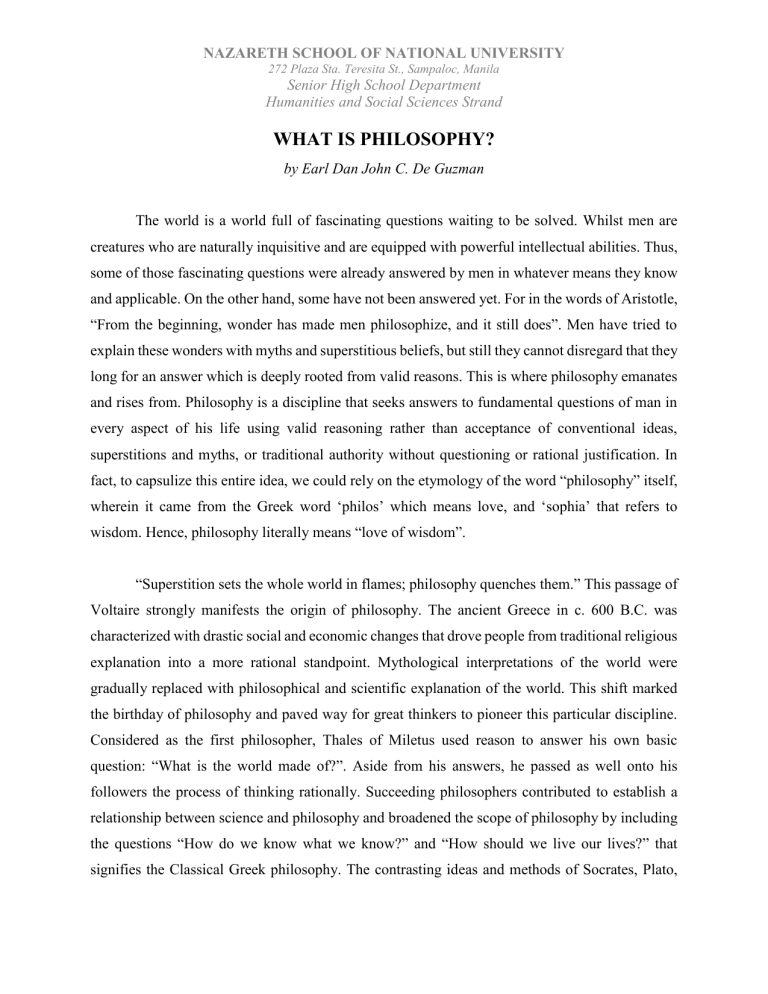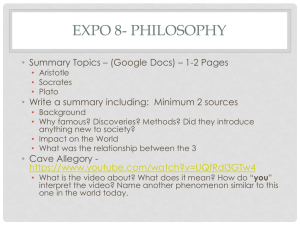
NAZARETH SCHOOL OF NATIONAL UNIVERSITY 272 Plaza Sta. Teresita St., Sampaloc, Manila Senior High School Department Humanities and Social Sciences Strand WHAT IS PHILOSOPHY? by Earl Dan John C. De Guzman The world is a world full of fascinating questions waiting to be solved. Whilst men are creatures who are naturally inquisitive and are equipped with powerful intellectual abilities. Thus, some of those fascinating questions were already answered by men in whatever means they know and applicable. On the other hand, some have not been answered yet. For in the words of Aristotle, “From the beginning, wonder has made men philosophize, and it still does”. Men have tried to explain these wonders with myths and superstitious beliefs, but still they cannot disregard that they long for an answer which is deeply rooted from valid reasons. This is where philosophy emanates and rises from. Philosophy is a discipline that seeks answers to fundamental questions of man in every aspect of his life using valid reasoning rather than acceptance of conventional ideas, superstitions and myths, or traditional authority without questioning or rational justification. In fact, to capsulize this entire idea, we could rely on the etymology of the word “philosophy” itself, wherein it came from the Greek word ‘philos’ which means love, and ‘sophia’ that refers to wisdom. Hence, philosophy literally means “love of wisdom”. “Superstition sets the whole world in flames; philosophy quenches them.” This passage of Voltaire strongly manifests the origin of philosophy. The ancient Greece in c. 600 B.C. was characterized with drastic social and economic changes that drove people from traditional religious explanation into a more rational standpoint. Mythological interpretations of the world were gradually replaced with philosophical and scientific explanation of the world. This shift marked the birthday of philosophy and paved way for great thinkers to pioneer this particular discipline. Considered as the first philosopher, Thales of Miletus used reason to answer his own basic question: “What is the world made of?”. Aside from his answers, he passed as well onto his followers the process of thinking rationally. Succeeding philosophers contributed to establish a relationship between science and philosophy and broadened the scope of philosophy by including the questions “How do we know what we know?” and “How should we live our lives?” that signifies the Classical Greek philosophy. The contrasting ideas and methods of Socrates, Plato, NAZARETH SCHOOL OF NATIONAL UNIVERSITY 272 Plaza Sta. Teresita St., Sampaloc, Manila Senior High School Department Humanities and Social Sciences Strand and Aristotle made their time as the heyday of the Greek civilization and formed the backbone of Western philosophy. While on the other side of the world at the same time, Eastern philosophers were concerned with how best to organize a just society and provide moral guidelines for the society to abide by as shown in Confucianism, Daoism, and Buddhism. Wonders and curiosity of man served as platforms for questions that the early philosophers pondered. They tried to answer the question – “What is the world like?” through one of the main branches of philosophy concerning the nature of reality called Metaphysics. In order for the philosophers to rely on what they know, they also have to determine the scope and assess the reliability of their knowledge using Epistemology; the second main branch of philosophy that deals with the origins of the meanings, principles, methods and limitations of knowledge. People of Athens delved deeper into several concepts which can be found in the life of man, such as the concept of justice and goodness in Ethics, and the notion of art and beauty in Aesthetics. Aside from branches of philosophy that imposes questions, there is Logic that answers those questions grounded on valid reasoning in contrary to fallacies. Logic is considered as the toolbox of philosophers for it is used to form arguments and to ensure that ideas are valid. The origin of philosophy in the narrower sense is the discovery of argument. Since then, philosophy has plagued the minds of influential thinkers establishing different schools of thought. Consequently, the emergence of philosophy brought relevant and influential ideas that still affect the world today even though some of them were already proved to be wrong. It is because they still have much to tell us, thus, they do not become outdated. They make us think in new ways on how to view the world and contribute to the innovation of human mind. We’re quite sure that not all things can be explained by man. Nevertheless, there is philosophy that deals with questions that science cannot explain and religion does not. That makes philosophy too complex and sophisticated. Like what Bertrand Russell said, “the point of philosophy is to start with something so simple as not to seem worth stating, and to end with something so paradoxical that no one will believe it”.



